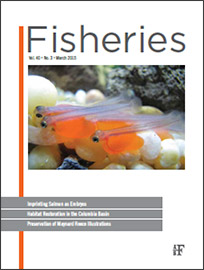Upcoming Symposium
Culture, Biology, and Management Of Asian Carps In North America.– The Introduced Fish Section, in conjunction with the Fish Culture Section is hosting the symposium entitled Culture, Biology, and Management Of Asian Carps In North America at the upcoming annual meeting in Little Rock, Arkansas. Session organizers Duane Chapman of the IFS and Jesse Trushenski of the Fish Culture Section provide the following description of the symposium: Extreme population growth of bighead and silver carps in the large rivers and connected waters of the central United States, and the threat that they may invade the Laurentian Great Lakes, have caused great public concern and spurred enormous efforts in research and management of these species. Grass carps and black carp are also Asian carps with worldwide aquaculture use and have similar importation history and reproductive strategies. There is great concern that these fishes may have similar undesirable ecological effects and pose similar risks. Research on these fishes is rapidly increasing our understanding of Asian carp biology. Management tactics and strategies, informed by new understanding, are in use that have never before been used in the control of invasive species. At the same time, the worldwide benefits of these fishes as food fish and biological controls cannot be denied, and Asian carps remain important to both fisheries and aquaculture.
This symposium is designed as a forum for those working for the control of Asian carps, and also for those working to achieve and retain benefits from these species, both in the wild and in aquaculture. The session will include different perspectives of the Triploid Grass Carp Certification Program, a new risk assessment of grass carp in the Great Lakes, discuss the effectiveness of current management of wild Asian carps by harvest, and marketing strategies to enhance harvest. The symposium will also include a description of the unique cohesive interagency management strategy that has evolved to combat the environmental problems, and new research on the biology and effects of these fishes.

